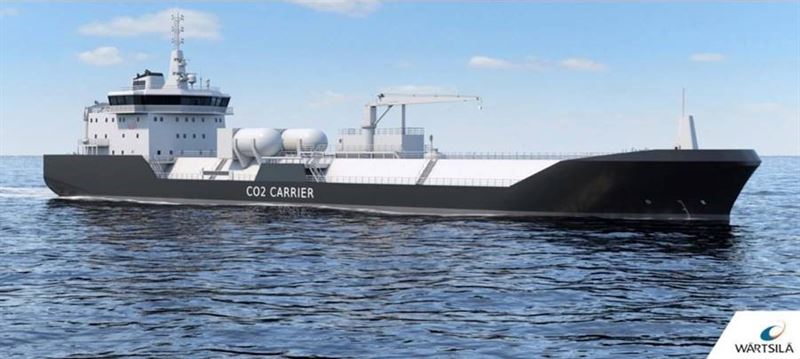The technology group Wärtsilä has conducted a study on the systems and solutions required for Liquid CO2 Carrier (LCO2) vessels. Wärtsilä Gas Solutions has developed a cargo tank design suitable for LCO2 applications, which was recently awarded Approval in Principle (AiP) by the classification society DNV. Since new LCO2 Carriers are an emerging concept and requires detailed attention during conceptual level, Wärtsilä’s experience and know-how in gas cargo and handling systems proved invaluable to the results.

The total cargo capacity of the vessels is 7500 cbm, divided into two containment tanks, each of 3750 cbm. Wärtsilä has carried out an intensive engineering analysis to formulate an optimum design for the vessels’ containment system and cargo handling systems, bearing in mind the specific nature of LCO2.
“Liquid CO2 is increasingly relevant in global efforts to reduce greenhouse gas emissions and promote a greener future. It represents an important link in the value chain for the entire carbon capture infrastructure. In developing a robust and proven concept, both in the cargo containment and cargo handling requirements for LCO2 Carriers, we have drawn on our unparalleled experience in gas carrier segments. The AiP from DNV is a valuable endorsement of this work,” says Pål Steinnes GM Sales, Wärtsilä Gas Solutions.
“We have been pleased to work with Wärtsilä Gas Solutions on this reliable design concept. The review process has been extensive, and we trust that their solution will contribute to facilitating the trade in liquid CO2 as a factor in reducing emission” says Monika Johannesen, Head of Department, Gas Carrier Excellence Center at DNV.
Capturing and storing CO2 is an important strategy in efforts to reduce global CO2 emissions. According to the Intergovernmental Panel on Climate Change (IPCC), global greenhouse gas (GHG) emissions must be reduced by 50 to 80 percent by 2050 to avoid dramatic consequences of global warming.
Wärtsilä Gas Solutions is a market leader with innovative systems and lifecycle solutions for the gas value chain. Our main focus areas are handling of gas in seaborne transport (storage, fuel, transfer and BOG management), gas to power, liquefaction and biogas solutions. We help our customers on the journey towards a sustainable future through focus on lifecycle, innovation and digitalization.